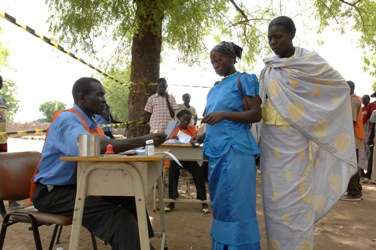AU, UNIFEM caution election observers on women’s status
By Julius N. Uma
April 11, 2010 (JUBA) – As part of efforts to boost women’s affirmative action as enshrined within Sudan’s Constitution, officials from both the African Union (AU) and United Nations Development Fund for Women (UNIFEM) held a gender and election briefing meant to acquaint election observers with the status of women’s involvement in the ongoing election process.

While addressing the AU observers and monitors, Ms. Hodan Addou, UNIFEM Country Director for Sudan, noted that when assessing gender aspects related to Sudan’s nationwide elections, it is essential that elections observers and monitors consider the overall context of the status of women in Sudan.
She cited the alarmingly high levels of illiteracy within the female electorate, also noting cultural and social barriers impeding women’s political participation and rights, including sexual and gender-based violence, insecurity, displacement and poverty as some of the key issues observers need to take into consideration during these historic elections.
In a related development, Ms. Jerisa Kide from the South Sudan Elections High Committee said out of the 2,859 registered candidates there are 820 female candidates contesting in the country, at all levels except for the Government of South Sudan presidency. The total number of polling stations is put at 12,789.
Ambassador Stanislas Nakaha, the head of the Juba-based AU liaison office further reiterated the role of his elections monitoring and observation team, saying gender aspects will fully be taken into firm consideration.
“We have evidence that women are more than ready to take up decision making positions in Africa and to practice their political rights as enshrined in our AU charter and protocols. We will ensure that our monitoring and observation team will take gender perspective into account. The recommendations that the observer mission will make on the improvements in the electoral process will help to inform future processes and we hope to highlight challenges and lessons learned for increasing political awareness and participation of women,” the AU official said.
This month’s general election, according to an April 10 statement, represents an unprecedented opportunity to rectify gender inequalities in political decision-making processes. As such, UNIFEM and its partners have been working to support women’s effective participation in the elections through training sessions for women leaders from all ten states to workshops held at universities to sensitize young female voters in South Sudan.
In attendance were members of the observation missions, who include former and current African diplomats, judges, academics, military officials and civil society activists. The special envoy to Sudan from the Swedish Foreign Ministry, Ambassador Michael Fruhling, also attended the AU-UNIFEM briefing.
(ST)
